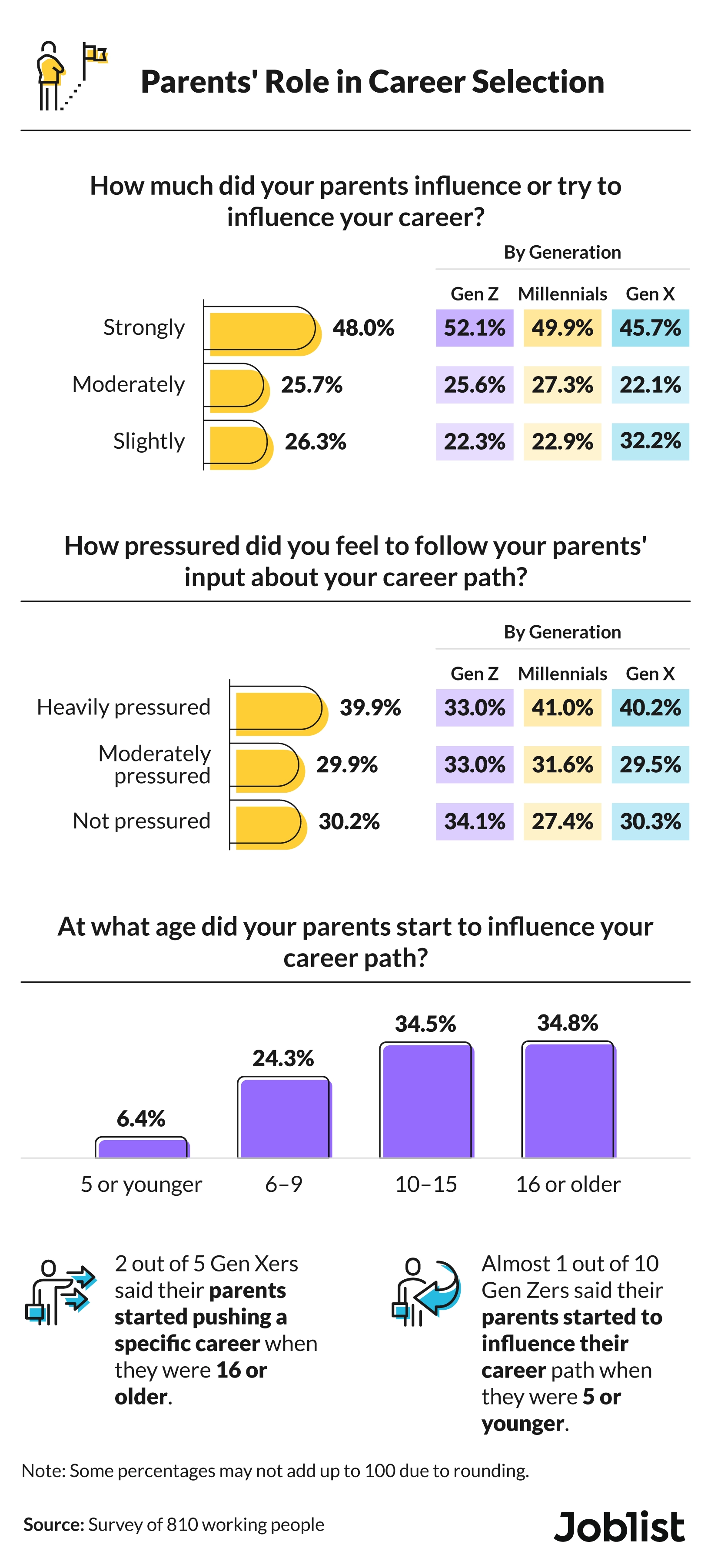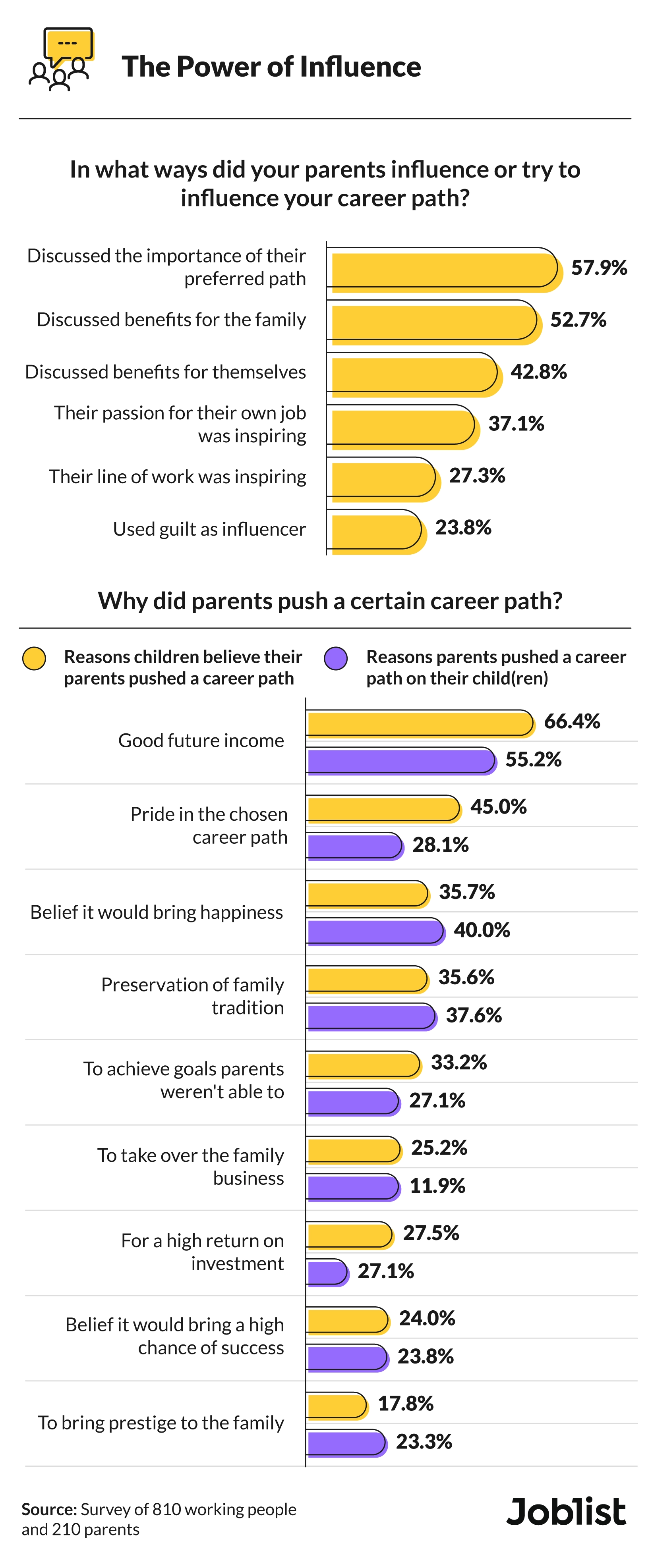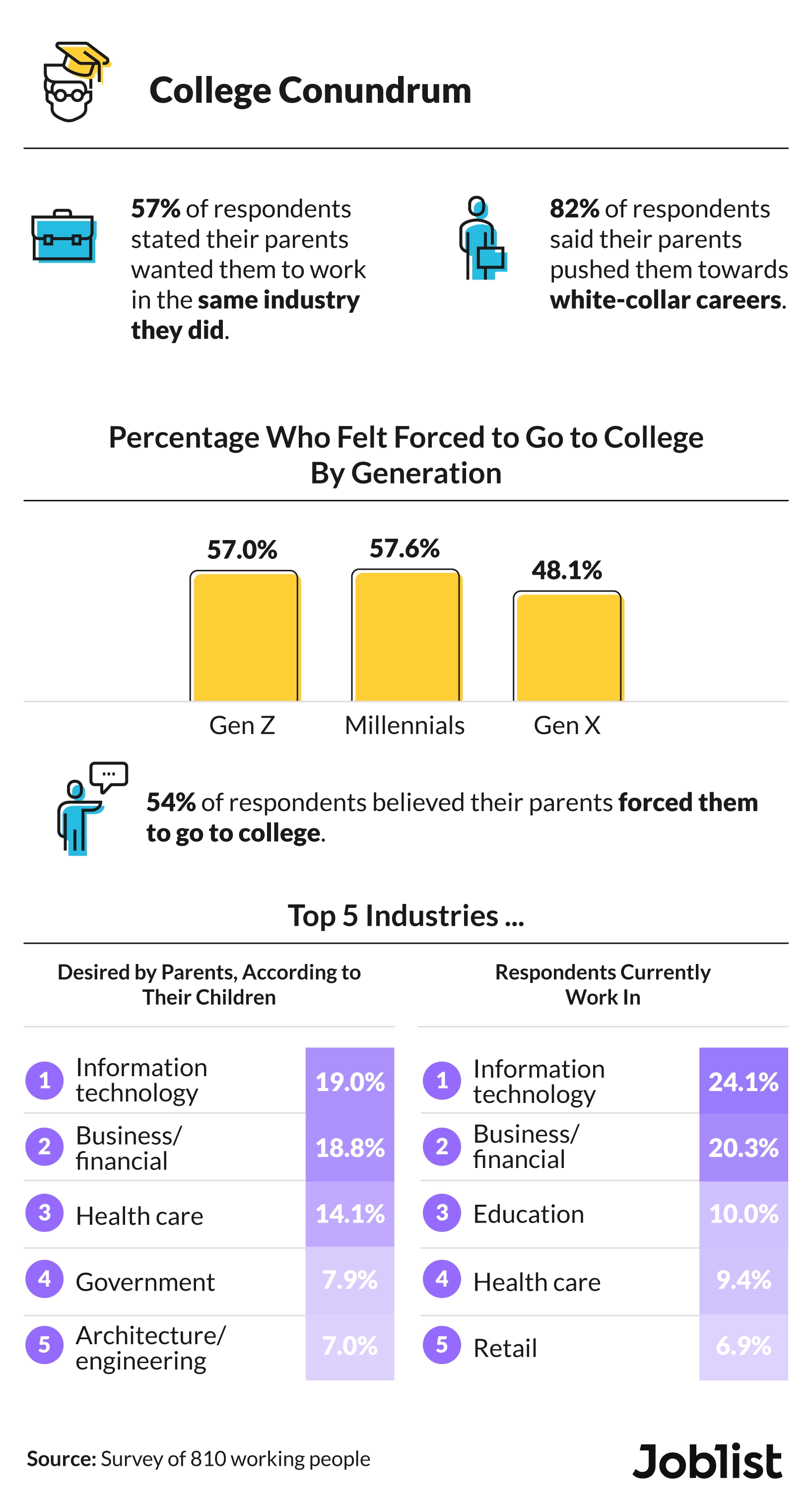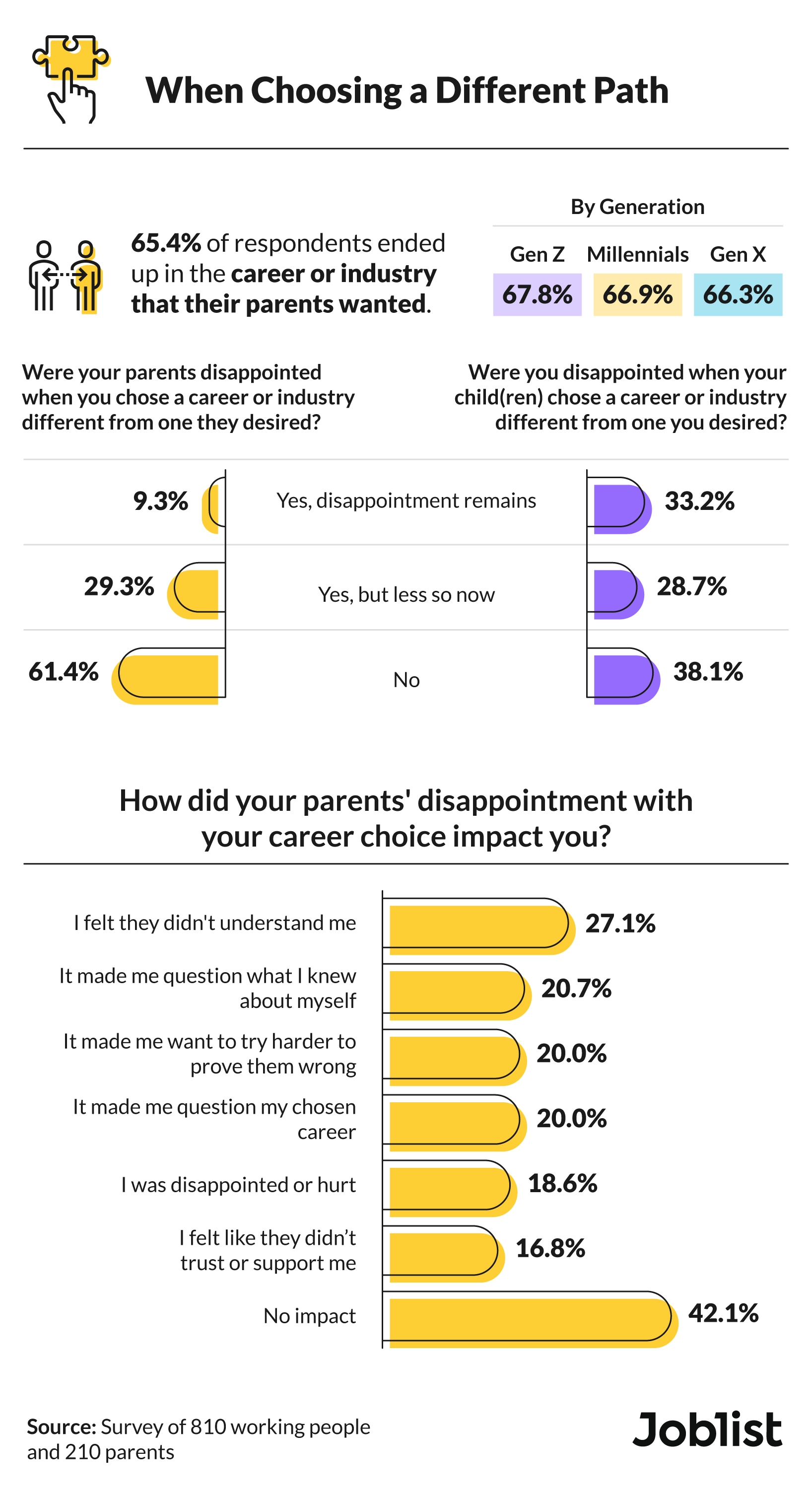The older we get, the more we are encouraged to spread our wings. This is especially the case for young adults who are in the midst of their self-discovery journeys and learning about what kind of life they want to make for themselves. Sometimes, though, parents feel strongly about the path their kids will take and might become an influential factor in their decision-making processes. We surveyed 210 parents and 810 currently employed people to learn more about their thoughts on parental influence pertaining to career choices.
How much pressure did people feel to consider their parents’ input? What kind of things did parents say to try and influence respondents in a certain direction? Were parents disappointed if their kids didn’t go down the route they wanted them to? Read on to learn more about the parent-child dynamic when it comes to determining one’s future.
Feeling the Heat
We started out by asking our respondents to describe how much their parents influenced their career path.

According to almost half of our respondents, their parents had a significant influence on their career path. Gen Zers felt the most as if they were being guided in a certain direction by their parents. Otherwise, it was a near-even 25% split on whether respondents felt moderate influence or not much influence at all from their parents.
This influence translated into pressure for just about 40% of respondents, with Gen Zers feeling less heat than millennials and Gen Xers, despite their parents influencing them the most in the first place. This generational split remained consistent among people who said they felt moderate or no pressure at all. Naturally, parents rarely felt the need to influence their childrens’ career decisions at a very young age but started to ramp up when they turned 10 years old.
Parents should be aware of the effects — both good and bad — that they might have on their kids based on the values they impart on them. For example, parents with high academic standards might admonish their children for not being at the top of their class or criticize them for choosing an arts program instead of a more traditional career path like law or medicine. On the other hand, a child whose parents are more open-minded might feel more inclined to explore different careers, free of influence.
This Is Best for You
Next, we compared children’s and parents’ perspectives on why they suggested certain career paths and tried to find out more about the tactics used to convince children to pursue a certain profession.

To sway their kids in a specific direction, parents used different strategies when talking about their future career paths. The most common tactic was to outline their own preferences regarding their children’s future, but over half also discussed the benefits for the family as a whole. Two-thirds of Gen Zers said their parents discussed the importance of their preferred career path with them, compared to half of Gen Xers. Also, 63.8% of Gen Zers said their parents discussed a certain career path’s benefits to the family, compared to slightly more than half of millennials and Gen Xers.
Meanwhile, although ranking as the lowest tactic, 23.8% of parents opted to guilt their children into a certain career path, which can have damaging results. Research has shown that it could lead to less independence, lower productive reasoning during early adulthood, and a decreased ability to develop healthy relationships. Among the generations, Gen Xers were the most likely to have been guilted toward a certain career path by their parents.
Over 66% of people had a hunch that the primary reason their parents were pushing them toward a specific career path was for income-related reasons, and they were right, seeing as over half of parents confirmed this theory.
Where to Work
Nearer in the future of a child’s career path is their choice to attend a college or university. In our survey, we tried to find out more about how parents influence their children when it comes to higher education.

Fifty-four percent of respondents felt that their parents had forced them to go to college, with Gen Zers and millennials saying so more than Gen Xers. Upon graduating, children felt that their parents would most like them to enter the information technology and business/financial sectors. Coincidentally (or not?) those are the top two industries that respondents were currently working in.
Our survey results also demonstrated that in addition to influencing their children’s career choices, well over half of parents wanted them to enter the same industry as them. For many, this means taking over the family business, which can be a tricky thing. On one hand, taking over an established business is advantageous, and there’s an element of pride in carrying on a family tradition. That being said, family tension could arise due to ideological differences, or children might feel as if they’re not exploring their own career aspirations to the fullest extent.
Tension Rising
However, not everyone listens to their parents’ input. We wanted to find out more about the impact this had on those who went against their parents’ advice.

In the end, nearly two-thirds of respondents were influenced by their parents to such an extent that they pursued the career their folks wanted for them. Ninety-six percent of family-owned businesses in the U.S. expect growth in 2022 — up from 82% in 2021 — so they’ll need all the help they can get from second-, third-, and even fourth-generation family members! For the ones who chose to go down their own path, over 60% said their parents understood and were not disappointed. That being said, when parents were asked the same question, over 60% said they were indeed unhappy with their children’s decision, although 28.7% of them said they were less disappointed now than they had been initially.
No one likes to disappoint their parents, and many have felt the effects of it. While their parents’ disapproval had no consequence for 42.1% of respondents who chose to forge their own path, over a quarter felt that their parents didn’t understand their decision. Some had other reactions, too: people began to question themselves and their career choice, while others used the disapproval as motivation to prove their parents wrong. The rest were simply upset or felt a lack of trust and support from their parents.
You Can Go Your Own Way
For nearly half of our respondents, their parents were a strong influence on them as they began to think about what kind of career path they wanted to take, and often, this influence turned into pressure. Parents explained the importance of their preferred decision and outlined why it would be beneficial to their kids for a number of reasons. To put it bluntly, most just wanted their kids to achieve good financial standing in their life and directed them to jobs that would achieve just that.
Favorable industries to enter included the information technology and business/finance sectors, and nearly two-thirds of respondents ended up with a job that satisfied their parents’ wishes. If they chose their own path independent of their folks’ advice, most parents would understand, but some were disappointed, which affected their kids in different ways.
The reality is, everyone should feel satisfied and proud of the career they want to pursue. At Joblist, your dream job could be just a few clicks away! We offer an in-depth and personalized job search experience, matching you with work opportunities that are right up your alley. So what are you waiting for? Make peace with your career goals and, first and foremost, make yourself proud.
Methodology and Limitations
This study uses data from a survey of 810 people that are currently employed and 210 parents located in the U.S. Respondents were gathered through the Amazon Mechanical Turk survey platform where they were presented with a series of questions, including attention-check and disqualification questions. 55.7% of respondents identified as men, while 44.3% identified as women. Respondents ranged in age from 19 to 80 with an average age of 35. Participants incorrectly answering any attention-check question had their answers disqualified. This study has a 3% margin of error on a 95% confidence interval.
Please note that survey responses are self-reported and are subject to issues, such as exaggeration, recency bias, and telescoping.
Fair Use Statement
We kindly ask that you share this article for noncommercial use only and provide a link back to the original page so contributors can earn credit for their work. Source: The Impact of Parental Influence: Career Edition | Joblist


